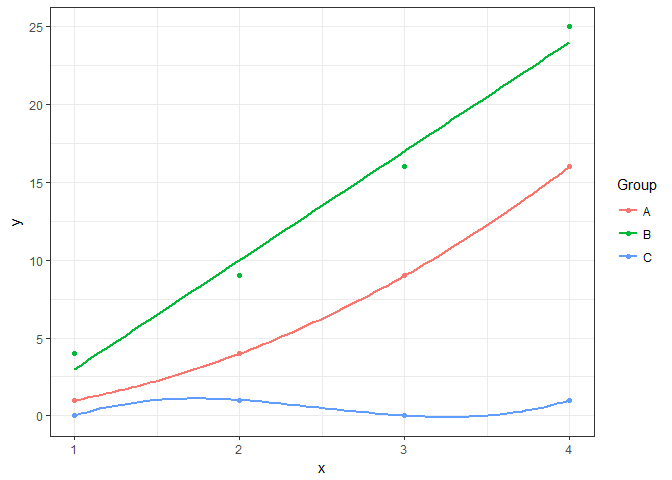I'm not sure there's a way to do that built-in to geom_smooth. I think the method.args argument just passes fixed values, and I'm not sure it would work well with formula even if it did. I put together something hackily "functional" using purrr::reduce2, since I actually have a similar problem that I'll be working on soon.
suppressPackageStartupMessages(library(tidyverse))
# Sample data
dat <-
structure(
list(
Group = c("A", "A", "A", "A", "B", "B", "B", "B",
"C", "C", "C", "C"),
Order = c(2, 2, 2, 2, 1, 1, 1, 1, 3, 3, 3, 3),
x = c(1, 2, 3, 4, 1, 2, 3, 4, 1, 2, 3, 4),
y = c(1, 4, 9, 16, 4, 9, 16, 25, 0, 1, 0, 1)
),
.Names = c("Group", "Order",
"x", "y"),
row.names = c(NA, 12L),
class = c("tbl_df", "tbl", "data.frame")
)
dat
#> # A tibble: 12 x 4
#> Group Order x y
#> * <chr> <dbl> <dbl> <dbl>
#> 1 A 2 1 1
#> 2 A 2 2 4
#> 3 A 2 3 9
#> 4 A 2 4 16
#> 5 B 1 1 4
#> 6 B 1 2 9
#> 7 B 1 3 16
#> 8 B 1 4 25
#> 9 C 3 1 0
#> 10 C 3 2 1
#> 11 C 3 3 0
#> 12 C 3 4 1
# Find the unique Group/Order combinations
dat %>% select(Group, Order) %>% distinct() %>%
# Then graph them
{
reduce2(.init = ggplot(data = dat, aes(x = x, y = y, color = Group)),
.x = .$Group,
.y = .$Order,
function(prev, .x, .y) {
force(.y) # The formula below won't evaluate .y by itself
prev + geom_smooth(
data = dat %>% filter(Group == .x),
method = "lm",
se = FALSE,
formula = y ~ poly(x, .y))
})
} +
# Show that we still have a valid ggplot object
geom_point() +
theme_bw()
